Professor Harnesses Theatrical Power For Fulbright Experience
April 4, 2012
SHSU Media Contact: Jennifer Gauntt
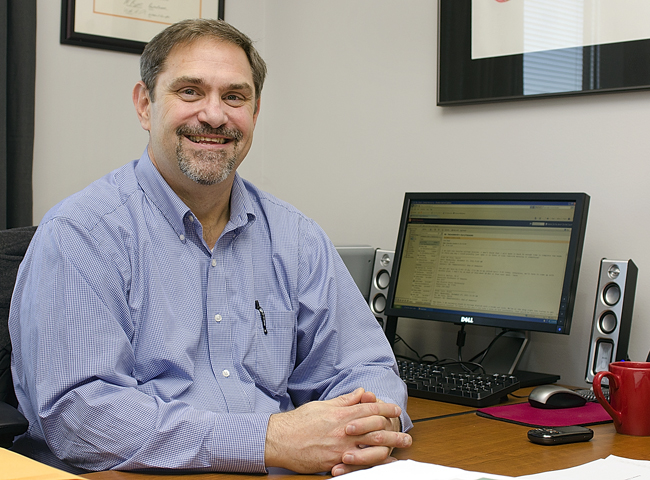
Sam Houston State University associate professor of theatre David McTier understands the power that theatre can have that goes well beyond the entertainment value that many may affiliate with it.
“In the areas where you have the greatest struggles, the greatest challenges, there is usually a great need for communities to express their shared concerns,” McTier said. “We as Americans, sadly, tend to think too often of theatre as a luxury, as entertainment, but most of the history of theatre and certainly in central Europe, you have situations where the need to gather to express themselves in community is the core, the heart of theatre.
“Consider Czechoslovakia after the fall of communism,” he continued. “Who was their first president? A playwright, Václav Havel. All along, he had been writing plays that dealt with the problems that they were dealing with. Theatre there is an incredibly active political expression, community expression. It’s not just simple entertainment.”
It is these kinds of ideals that McTier is sharing with students in Pristina, Kosovo, as Kosovo’s first Fulbright scholar in the area of theatre. McTier left the United States in January to teach dramatic theory and criticism at the University of Pristina, as well as direct a performance with their drama students. He plans to return Aug. 12.
The University of Pristina selected McTier as their Fulbright Scholar after a rigorous application process. Most of the previous scholars who have taught at the University of Pristina have come from “very practical” disciplines such as political science, and he’s the first from the fine arts to come in, he said.
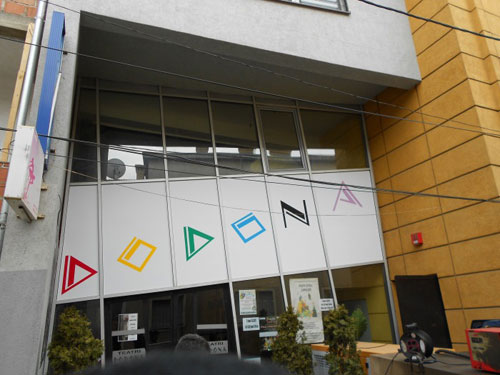 |
| Theatre is a big part of life in Kosovo. Above, McTier shows us the Dodona Theatre in his favorite area of Pristina, which is also the neighborhood he currently lives in as part of his Fulbright Scholar experience. Below, McTier saw "This Means War" in the ABC Kino, a cinema chain in Kosovo, when the ballet "Don Kishoti" ("Don Quixote") was sold out. —Photos courtesy of McTier, via davidmctierinkosovo.com |
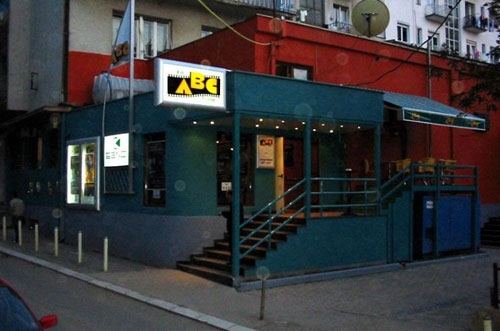 |
The Fulbright Scholar program is a competitive international exchange program that sends thousands of professors overseas annually. Professors are only allowed to select one country in which to teach when applying. If the school does not select them, they do not receive the Fulbright grant, according to McTier.
In communicating with the University of Pristina during the application process, McTier said he worked to understand their needs for a professor.
Because the University of Pristina has approximately 28,000 students, primarily of Albanian heritage, who speak a dialect of Albanian (he is utilizing an interpreter to teach classes) and are mostly Muslim, McTier said he felt teaching a criticism and theory course may be beneficial for the students there in helping to expand their worldviews.
“I have lots of really wonderful students who don’t always necessarily have a full awareness or appreciation for people who are different from themselves. Our tendency so often, and this is world-wide, is if somebody is different, they must be wrong, or if they don’t have the same beliefs or values, instead of appreciating that as simply different, we equate that as being wrong,” McTier said. “What I try to do here is make people aware that there are different ways of thinking, if you can put yourself in somebody else’s shoes.
“When I teach theory and criticism here, this is the first time many of my students are dealing with a feminist reading of a play, a Marxist critique. It’s a notion that everybody might not perceive, understand and judge the way you do; that this is all enculturation,” he said. “That was part of my proposal, that in a country that has been torn by civil war, where students have considerable apprehension, if not enmity, to other people who might even be living in the same city, that you can use theatre and educational theatre to help nurture awareness and appreciation.”
This idea of using theatre to bring about a greater awareness and appreciation for ideas that may be foreign to one’s own beliefs is something McTier said he has experience with. While teaching at a Jesuit university in Kansas City, when the war in Iraq began, the artists there came together to create an original piece about the effect of war on women, “the idea being that likely the women are not the direct participants but are more likely to be the casualties, women and children,” he said.
Knowing that there is an active theatrical movement in Kosovo that is currently working to make a difference in the country was part of what was so enticing to him when deciding to apply in Kosovo.
“Right now there’s a theatre in Pristina, called Quendra, and it just means center, and it’s a multimedia hub. They’re really struggling with things on their agenda as an arts center like women’s issues, women’s rights, safety. They’re also dealing with GLBT issues, gay and lesbian rights and protection,” he said. “It’s not just people who are artsy-fartsy just doing something aesthetically pleasing. It’s about having things to say and theatre being one of the vehicles for saying what they need to say.
“They had a project recently for which the whole goal was to essentially nurture understanding. This project was developed so that it would be performed in Kosovo, in Pristina, and then move across the border into Serbia. It would play in different cities, but cities that are hostile to each other, because the whole idea is to make people gather in person to deal with a difficult issue,” he said. “This is a situation in which people are killing each other, Serbs were killing Kosovars and vice versa. The idea is to use this as part of the healing process, and a lot of it simply comes from (the notion that) awareness is the first step and hopefully to enculturate some sense of understanding and then, maybe at some point, some appreciation for each other.”
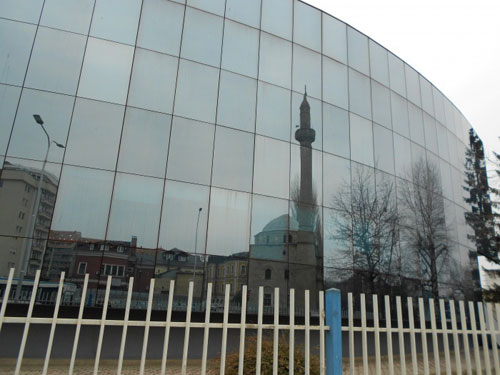 |
| Above, the reflection of a mosque in the side of a building, visible in McTier's Dodona neighborhood. The primary religion in Kosovo is Islam. Below, Central Canal and Boulevard, one of the many scenes McTier witnessed during his recent United Nations Mission in Kosovo trip to Tiranë, the capital of Albania. |
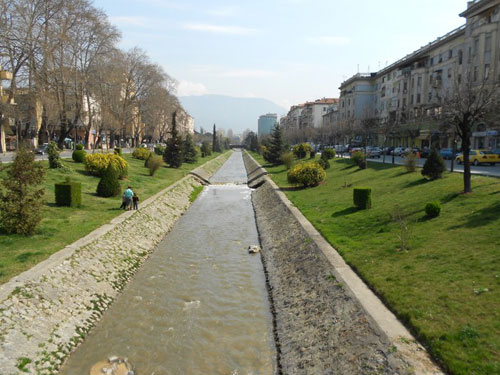 |
While there, McTier is mentoring directing students and directing a play that will be performed at the country’s national theatre, equivalent to the Kennedy Center in the U.S.
“How exciting for me to go into an environment where there is a fundamental need. The core of theatre is live community expression, and when you have a situation where you have had great challenges, that’s where you find this need to gather,” he said.
“These days we can Skype each other and Facebook each other like crazy, and that probably has some impact on theatre, but the idea that we need to get together and address our grievances and our interest, for me, that’s very exciting. To be in the newest country in the world is very exciting; to be in a place that doesn’t have all the creature comforts, that’s exciting; to be in an environment outside of the Bible belt and see all of the diverse people in the world, it’s all exciting.
McTier is also serving as an ambassador for the United States, the Fulbright program, and SHSU.
“I will be handing out souvenirs throughout my stay; I’m bringing SHSU writing pens because I’ve been told they need good writing pens,” he said. “We are told job No. 1 when we’re there is not to do what our grant says; our No. 1 job is so that people can meet a real American who probably will debunk all the stereotypes they’ve ever had, who will not be the American they see in the films or on television but to provide a real, and hopefully favorable impression of our country.”
To share in McTier’s experience and read about what’s going on in his classes, visit his blog at http://davidmctierinkosovo.com/.
- END -
This page maintained by SHSU's Communications Office
Associate Director: Julia May
Manager: Jennifer Gauntt
Located in the 115 Administration Building
Telephone: 936.294.1836; Fax: 936.294.1834
Please send comments, corrections, news tips to Today@Sam.edu.

 SamWeb
SamWeb My Sam
My Sam E-mail
E-mail

